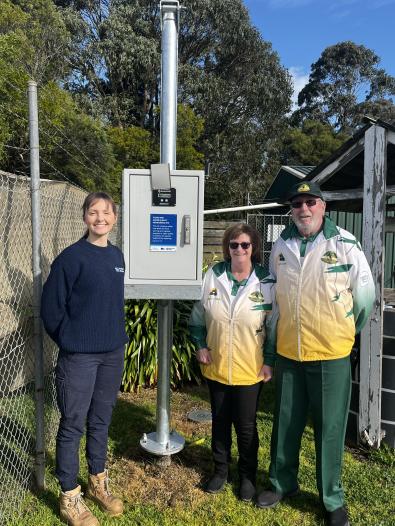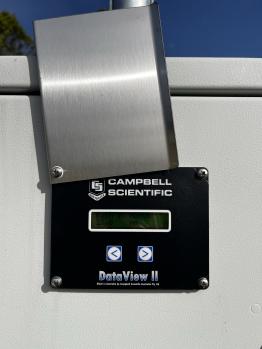
Wallan Bowls Club boosts Melbourne Water's rain mapping with real-time data from onsite rain gauge
An enhanced digital rain gauge installed at a lawn bowls club in Wallan will add another important data point to Melbourne Water’s network of 200 rain gauges, providing hourly, real-time data to map rain patterns.
Melbourne Water collects and analyses data from digital rain gauges on its own land supplemented by digital rain gauges on private property, such as the Wallan Bowling Club.
Melbourne Water installs and maintains the digital rain gauges as part of the ‘telemetry’ network. Telemetry is the automatic data transmission from remote locations to a central system.

“Digital rain gauges are a vital part of our telemetry system, helping us collect real-time rain data,” said Sarah Beattie, Melbourne Water Senior Hydrographer.
“Understanding rainfall patterns across Melbourne helps us plan for the future and provide supporting data for Melbourne Water projects,” she said.
The community can view an interactive map with rainfall, river level and flow data from over 200 monitoring sites across Melbourne.
The data is automatically sent every hour via radio signals from electronic rain gauges, such as the one at Wallan Bowls Club, recording the amount of rain and time that it fell.
The enhanced digital rain gauge at Wallan Bowls Club replaces the old one that had been there for decades. The new gauge has a digital screen, improving community engagement by allowing bowls club members to easily view rain data for the day, month, year.
“Collecting rainfall data and expanding our network of rain gauges means we can plan responses to droughts and floods, and ensure rivers and creeks have enough water to support local wildlife,” said Ms Beattie.
“Melbourne Water is continuing to grow its network of rain gauges to keep up with data demands,” said Ms Beattie.
The rain gauge data is sent in real time via radio signals from the electronic rain gauges, recording the amount of rain and time it fell. Community members can view granular rainfall and river level data from over 200 monitoring sites via a public-access webpage.
The Wallan area is a priority area for rainfall monitoring because of its location in a growth corridor, where increased urban development can cause an increase in runoff after rain.

Wallan Bowls Club Treasurer, Pam Cowen, says that the club is proud to contribute to Melbourne Water’s rain mapping.
“The new gauge tells me how much rain we’ve had overnight, how much for the month so far, and for the year. It’s fascinating,” said Pam.
Pam notes that July’s rainfall topped 86mls.
“That’s good news for our three water tanks, which we use for watering the green in the drier months,” said Pam. “That’s the wonderful thing about rain, it’s free!”
Become a volunteer community rain reader
In addition to the 200 digital rain gauges managed and owned by Melbourne Water, a network of 300 volunteer community rain readers report rainfall data captured by their personal rain gauge. View daily rainfall data recorded by our network of over 300 volunteer community rain readers.
<Ends>
Media contact:
03 9679 7004 or [email protected]



